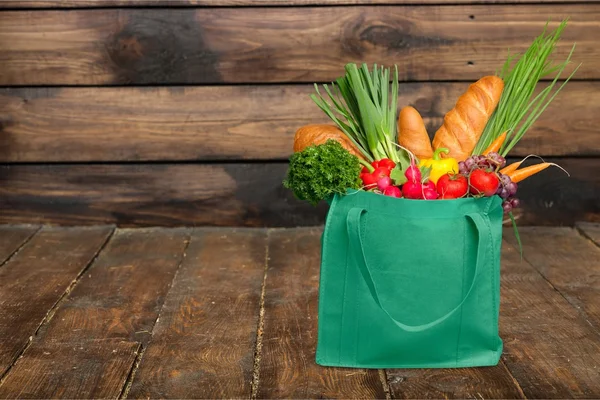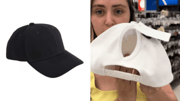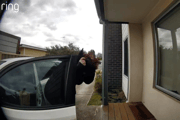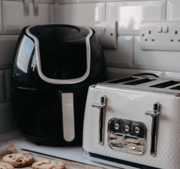
You've probably been there—standing at the checkout, unloading your groceries, when the person serving you makes an offhand comment that stops you in your tracks.
For American shopper Kaylen, that moment came when her Trader Joe's checkout operator praised her reusable bags, then casually mentioned how well 'they wash.'
Wait, what? We're supposed to be washing these things?
Kaylen's confusion, shared in a now-viral social media video, has sparked a heated debate that's got Australian shoppers checking their own bag collections with newfound suspicion.
And unfortunately for those of us who treat our reusable bags like permanent fixtures, the research suggests that the checkout operator was absolutely right.
The uncomfortable truth about our trusty shopping companions
Studies have found that 97 percent of people never wash their reusable grocery bags—which means most of us are walking around with what researchers politely call 'bacterial contamination' and what checkout workers describe in far less scientific terms.
'As a former cashier. Some peoples bags reeked, were sticky and over disgusting. Wash or wipe them at least pls,' one worker commented on Kaylen's video. Another added even more concerning details: 'I'm a cashier and PLEASE PLEASE WASH THEM!!!! People come to me with BLACK MOULD in their bags all the time.'
The research backs up these frontline reports. Studies have found that 64 per cent of used reusable bags showed bacterial contamination, with 30 per cent having elevated bacterial counts and 24 per cent showing mould presence.
'10 percent of the reusable bags contained E. Coli, a fecal bacteria that can make us sick'
Why this matters more for Australian shoppers
Here in Australia, we've been ahead of the curve with plastic bag bans. Research from 2023 found that 98 per cent of South Australian survey respondents already own reusable shopping bags, and similar adoption rates exist across the country following state-by-state plastic bag bans.
This widespread adoption means millions of Australians are potentially carrying around unwashed bags week after week. Food safety professionals warn that those unwashed bags are 'teeming — absolutely teeming — with the baddies of the bacteria world, including E. coli 0157:H7 and other pathogens that cause food-borne illnesses'.
For older Australians, this presents particular concerns. Age-related changes to our immune systems can make us more susceptible to foodborne illnesses, and with more than 5 million cases of food poisoning occurring in Australia each year, bag hygiene becomes a genuine health consideration rather than just good housekeeping.
Australian bag washing guidelines
Safe Food Queensland recommends:
- Cloth bags: Machine wash with regular detergent, then line dry
- Synthetic bags: Hand wash in warm soapy water, air dry completely
- Always ensure bags are thoroughly dry before storing
- Wash weekly or after carrying raw meat
The science behind the contamination
University research has found large numbers of bacteria in almost all tested bags, with coliform bacteria in half and E. coli identified in 12 per cent of bags. But here's the really concerning part: when meat juices were added to bags and stored in car trunks for two hours, bacterial numbers increased 10-fold.
Anyone who's ever left their shopping in the car while running another errand will recognise this scenario. Safe Food Queensland specifically warns against storing shopping bags in cars, noting this creates 'the perfect breeding ground for bacteria'.
The contamination doesn't just stay in the bags either. Research published in the Journal of Environmental Health found that contaminated reusable bags are highly likely to transfer pathogens to store employees and shoppers, particularly at high-contact points like checkout conveyors and grocery carts.
What Australian health experts recommend
Safe Food Queensland points out that most people have never washed their bags, despite reusable grocery bags being able to harbour 'nasty bacteria'. But there's good news: proper washing—whether by hand or machine—removes 99 per cent of bacterial contamination.
The key is making bag hygiene as routine as washing tea towels or doing the dishes. Food safety experts recommend laundering bags frequently, just as you would clothing and other cloth items.
Did you know?
Did you know? Ultra-violet light from sunlight is effective at killing 99.9 per cent of pathogens like viruses and bacteria. Hanging freshly washed bags in direct sunlight for at least an hour provides natural sanitisation.
Making bag washing manageable
If the thought of adding another weekly washing task feels overwhelming, Australian food safety experts suggest some practical alternatives:
Avoid using reusable shopping bags for other purposes like gym bags or beach bags, as this introduces additional bacteria that could contaminate food later. Keep them dedicated to groceries only.
Use a colour-coding system—one bag for raw meat products, another for fruit and vegetables, and another for packaged items. You can achieve this using different coloured bags or marking them with a permanent marker.
Always wipe down surfaces where you place your bags after shopping—like kitchen counters or dining tables—to prevent cross-contamination when you prepare food later.
Simple steps for safer shopping
- Wash cloth bags weekly in the washing machine with regular detergent
- Hand wash synthetic bags in warm, soapy water
- Use different bags for raw meat, produce, and packaged goods
- Never store bags in your car—choose a clean, dry cupboard instead
- Clean kitchen surfaces after placing down shopping bags
The bigger picture on food safety
This bag washing revelation fits into Australia's broader food safety picture. Food safety is everyone's responsibility, and while businesses must follow strict standards, many cases of food poisoning happen at home.
Simple hygiene practices—like washing reusable bags—are part of a comprehensive approach to food safety that includes proper food storage, regular hand washing, and keeping kitchen surfaces clean. For older Australians managing health conditions or medications that affect immune function, these practices become even more important.
The good news is that while bacterial contamination in reusable bags exists, the overall health risks remain low for healthy individuals. The goal isn't to create anxiety about shopping, but to add one simple habit that significantly reduces risk.
Have you been washing your reusable shopping bags all along, or has this been an eye-opening revelation? Share your bag cleaning tips—or confess your unwashed bag stories—in the comments below.
Original Article
https://honey.nine.com.au/living/cl...-washing/b3542f41-2554-4b2c-bb9c-7d56e0ba5dfd
Bacteria May Grow In Reusable Grocery Bags, But Don't Fret
Cited text: ... An industry-sponsored report find that 97 percent people don't wash their reusable grocery bags.
Excerpt: Studies have found that 97 percent of people never wash their reusable grocery bags
https://www.npr.org/sections/health...study-finds-bacteria-in-reusable-grocery-bags
Reusable Grocery Bags May Pose a Health Risk—The Scientific Evidence—Polymer Innovation Blog
Cited text: Ninety Seven percent (97 per cent) of shoppers never washed their reusable bags resulting in bacteria and other contamination detected on the reusable bags.
Excerpt: Studies have found that 97 percent of people never wash their reusable grocery bags
https://polymerinnovationblog.com/r...y-pose-a-health-risk-the-scientific-evidence/
Reusable Grocery Bags May Pose a Health Risk—The Scientific Evidence—Polymer Innovation Blog
Cited text: The single-use plastic bags and first-use reusable bags (the controls) showed no evidence of bacteria, mold, yeast or total coliform · 64 per cent of the “use...
Excerpt: Studies have found that 64 per cent of used reusable bags showed bacterial contamination, with 30 per cent having elevated bacterial counts and 24 per cent showing mould presence
https://polymerinnovationblog.com/r...y-pose-a-health-risk-the-scientific-evidence/
Guide to the ban on plastic shopping bags and food bag tags
Cited text: Research in 2023 found that 98 per cent of South Australian survey respondents already own reusable shopping bags, and 25 per cent of respondents do not use plastic s...
Excerpt: Research from 2023 found that 98 per cent of South Australian survey respondents already own reusable shopping bags
https://www.replacethewaste.sa.gov.au/guideline-bags
Your reusable shopping bags are teeming with bad bacteria | SBS Food
Cited text: Any food-safety professional or microbiologist will tell you, however, that those unwashed bags are teeming — absolutely teeming — with the baddies of...
Excerpt: Food safety professionals warn that those unwashed bags are 'teeming — absolutely teeming — with the baddies of the bacteria world, including E. coli 0157:H7 and other pathogens that cause food-borne illnesses'
https://www.sbs.com.au/food/article...-bags-are-teeming-with-bad-bacteria/2n6olulcg
Food standards and safety | Australian Government Department of Health, Disability and Ageing
Cited text: There are more than 5 million cases of food poisoning in Australia each year, both through businesses and at home.
Excerpt: with more than 5 million cases of food poisoning occurring in Australia each year
https://www.health.gov.au/topics/food-and-nutrition/about/food-standards-and-safety
Dr. Ryan Sinclair Reusable Shopping Bag Study | School of Public Health
Cited text: Large numbers of bacteria were found in almost all bags and coliform bacteria in half. Escherichia coli (E. Coli) were identified in 12 per cent of the bags a...
Excerpt: University research has found large numbers of bacteria in almost all tested bags, with coliform bacteria in half and E. coli identified in 12 per cent of bags
https://publichealth.llu.edu/about/blog/dr-ryan-sinclair-reusable-shopping-bag-study
Dr. Ryan Sinclair Reusable Shopping Bag Study | School of Public Health
Cited text: When meat juices were added to bags and stored in the trunks of cars for two hours the number of bacteria increased 10-fold indicating the potential f...
Excerpt: when meat juices were added to bags and stored in car trunks for two hours, bacterial numbers increased 10-fold
https://publichealth.llu.edu/about/blog/dr-ryan-sinclair-reusable-shopping-bag-study
Food Safety Reusable Shopping Bags | Safe Food Tips
Cited text: Although it may seem convenient, avoid storing your shopping bags in the car as this is the perfect breeding ground for bacteria.
Excerpt: Safe Food Queensland specifically warns against storing shopping bags in cars, noting this creates 'the perfect breeding ground for bacteria'
https://www.safefood.qld.gov.au/newsroom/food-safety-reusable-shopping-bags/
Coronavirus and reusable grocery bags: use them or pitch them? | News
Cited text: In a 2018 study published by the Journal of Environmental Health, Sinclair and his research team found that reusable bags are not only highly likely t...
Excerpt: Research published in the Journal of Environmental Health found that contaminated reusable bags are highly likely to transfer pathogens to store employees and shoppers, particularly at high-contact points like checkout conveyors and…
https://news.llu.edu/research/coronavirus-and-reusable-grocery-bags-use-them-or-pitch-them
Food Safety Reusable Shopping Bags | Safe Food Tips
Cited text: Did you know that your reusable grocery bags can harbour nasty bacteria? Not only this, but most people have never washed their bags!
Excerpt: Safe Food Queensland points out that most people have never washed their bags, despite reusable grocery bags being able to harbour 'nasty bacteria'
https://www.safefood.qld.gov.au/newsroom/food-safety-reusable-shopping-bags/
Reusable Grocery Bags May Pose a Health Risk—The Scientific Evidence—Polymer Innovation Blog
Cited text: Hand and machine washing was found to remove 99 per cent of the bacterial contamination.
Excerpt: proper washing—whether by hand or machine—removes 99 per cent of bacterial contamination
https://polymerinnovationblog.com/r...y-pose-a-health-risk-the-scientific-evidence/
Guide to Safe Use of Reusable Grocery Bags—Food Safety Blog
Cited text: Launder your bags frequently just as you would your clothing and other cloth items.
Excerpt: Food safety experts recommend laundering bags frequently, just as you would clothing and other cloth items
https://blog.foodsafety.com.au/guide-to-safe-use-of-reusable-grocery-bags
Coronavirus and reusable grocery bags: use them or pitch them? | News
Cited text: “Ultra-violet light occurs naturally from sunlight is effective at killing 99.9 per cent pathogens like viruses and bacteria,” Sinclair says.
Excerpt: Ultra-violet light from sunlight is effective at killing 99.9 per cent of pathogens like viruses and bacteria
https://news.llu.edu/research/coronavirus-and-reusable-grocery-bags-use-them-or-pitch-them
Food Safety Reusable Shopping Bags | Safe Food Tips
Cited text: Avoid using your reusable shopping bags for other purposes like as a nappy bag, gym bag or beach bag. This way you will avoid introducing bacteria to ...
Excerpt: Avoid using reusable shopping bags for other purposes like gym bags or beach bags, as this introduces additional bacteria that could contaminate food later
https://www.safefood.qld.gov.au/newsroom/food-safety-reusable-shopping-bags/
How Food Safe Are Reusable Shopping Bags?
Cited text: Keep one bag for raw meat products, another bag for raw fruit and vegetables, and another for packaged and ready-to-eat items. An easy way to achieve ...
Excerpt: Use a colour-coding system—one bag for raw meat products, another for fruit and vegetables, and another for packaged items.
https://foodsafety.com.au/resources/articles/how-food-safe-are-reusable-shopping-bags
Food Safety Reusable Shopping Bags | Safe Food Tips
Cited text: Wipe down all areas where your reusable bags are placed, like your kitchen counter or dining table, after you have removed your bags. This helps to re...
Excerpt: Always wipe down surfaces where you place your bags after shopping—like kitchen counters or dining tables—to prevent cross-contamination when you prepare food later
https://www.safefood.qld.gov.au/newsroom/food-safety-reusable-shopping-bags/
Food standards and safety | Australian Government Department of Health, Disability and Ageing
Cited text: Food safety is everyone’s responsibility.
Excerpt: Food safety is everyone's responsibility, and while businesses must follow strict standards, many cases of food poisoning happen at home
https://www.health.gov.au/topics/food-and-nutrition/about/food-standards-and-safety
Food standards and safety | Australian Government Department of Health, Disability and Ageing
Cited text: But it’s important for individuals too, as many cases of food poisoning happen at home.
Excerpt: Food safety is everyone's responsibility, and while businesses must follow strict standards, many cases of food poisoning happen at home
https://www.health.gov.au/topics/food-and-nutrition/about/food-standards-and-safety
Bacteria May Grow In Reusable Grocery Bags, But Don't Fret
Cited text: Even so, the health risks are low.
Excerpt: while bacterial contamination in reusable bags exists, the overall health risks remain low for healthy individuals
https://www.npr.org/sections/health...study-finds-bacteria-in-reusable-grocery-bags







